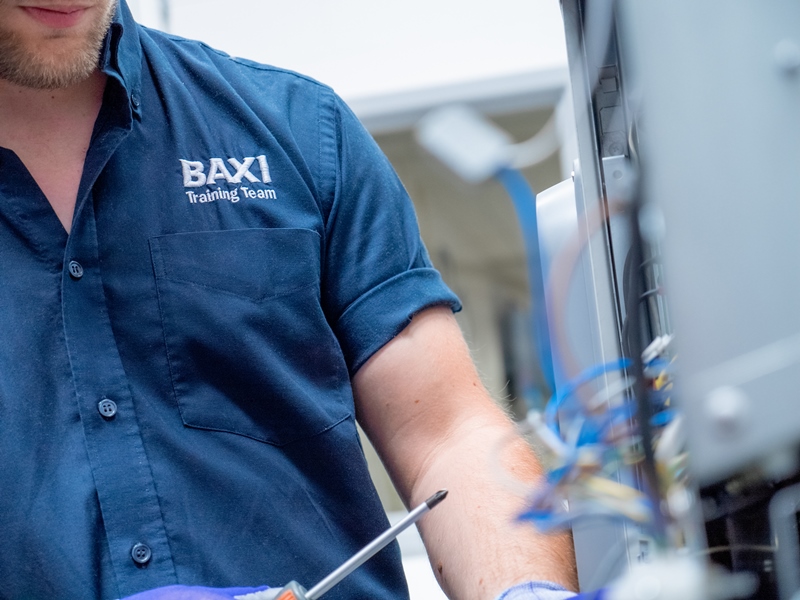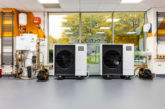
With Air Source Heat Pumps (ASHPs) gaining more attention than ever before, it is not surprising that many heating installers have questions about how to incorporate this technology into their portfolio. Baxi’s Training Manager, Ian Trott, answers some of the most frequently asked questions from installers about ASHPs and how to take advantage of the opportunities they present.
Q Why is it important for installers to get comfortable with ASHPs?
ASHPs can be a great choice for homeowners looking to reduce their energy consumption while helping the environment. Providing heating and hot water to UK homes accounts for 17% of the country’s carbon emissions, so it’s important we begin the transition to low-carbon solutions as quickly as possible.
While this is likely to mean a shift in the nature of the work heating engineers carry out, fundamentally they will be using many of the skills they have today. For installers open to offering heat pump installation work, it’s good to keep in mind two things: firstly, like all technologies, ASHPs need to be installed correctly; and secondly, getting the best support, training and expert guidance is key for those who want to expand their skills and benefit from this growing market.
Q What role do heat loss calculations play in ASHP installations?
When installing heat pumps, one skill that should never be underestimated is the need to perform accurate heat loss calculations. Heat loss calculations are needed to balance energy requirements with natural heat lost through building fabric and for the accurate sizing of heating systems. A detailed room by room heat loss calculation is therefore crucial to ensure the heating system works optimally, to heat the property properly and avoid unnecessarily high bills.
Approved Document L: Conservation of Fuel and Power (also known as Part L) requires heat loss calculations be carried out with every heating installation, so installers should ensure they are proficient in the methods involved.
To perform these calculations properly, installers must gather information about the building, such as window size and glazing, the type and state of insulation, as well as the size of the rooms and building overall. Heat loss calculations help to determine the most appropriate system for the situation it will be used in. Low-temperature heating systems, such as those using an ASHP, work far better when heat loss is known and accounted for, meaning these calculations should be seen as an integral part of an installation.
Q Are there any tools available to help me?
When it comes to performing heat loss calculations, there is a downloadable Microsoft Excel document available for free on the MCS website. This simplifies the process considerably as all installers have to do is input the information gathered into the document which will then provide the specific outputs needed.
Q Is a bigger heat pump system always better?
It’s a common misconception, especially among consumers, that a bigger system is better. The misplaced belief is that a boiler or ASHP that can heat a large house with 10 bedrooms would make light work of heating a two-bedroom semi-detached property and could even be more energy efficient. The reality is that the boilers and ASHPs that are best suited to smaller homes are the ones designed for smaller homes. The same is true for larger capacity heat sources better serving larger properties.
An oversized ASHP will consume more energy than a correctly sized one. Heating installers should be aware of this and ensure that they are sizing all systems correctly, as maximizing heating efficiency is one of the primary objectives of Part L.
Q What funding is available?
The Boiler Upgrade Scheme (BUS) allows homeowners who meet certain criteria to receive £7,500 towards replacing a gas boiler with an ASHP. This is issued as a voucher to the installer who redeems it and subtracts the value from the cost to their customer. The benefit to the homeowner is a £7,500 discount on their new, efficient heat pump system. The benefit to installers, meanwhile, is that the overall price the homeowner is expected to pay becomes much more affordable. The BUS helps to mitigate some of the concerns around cost and opens up a potentially huge market.
The BUS is planned to end in 2028 and, given the recent increase from £5,000 to £7,500, homeowner demand is expected to rise. As a result, installers have a great opportunity to add heat pumps to their portfolio.
Q What is involved in MCS accreditation?
Heating engineers who want to take advantage of the growing demand and BUS must be Microgeneration Certification Scheme (MCS) accredited. This involves getting familiar with technical standards for heat pumps and demonstrating competence with them. To support heating engineers with this, Baxi is delivering BPEC’s accredited heat pump course, which covers the principles of design, installation, commissioning, and servicing of ASHP systems. After a formal assessment that leads to a nationally recognised BPEC qualification, heating engineers can use the qualification to demonstrate competence in heat pump installation for their MCS application.
Taking time out of the working week and paying for a training course to qualify can sometimes be difficult for installers to justify. To help with the cost of courses and taking time out of work, the Government launched its Heat Training Grant, which gives installers £500 towards a heat pump training course – including the BPEC course delivered by Baxi’s specialist trainers.
As the country accelerates its decarbonisation drive, heating engineers will increasingly be viewed as energy consultants and becoming MCS accredited is an important part of growing into that evolved responsibility. Installers can apply directly to MCS to demonstrate their proficiency however there are also courses available that will help to prepare them for accreditation and to work confidently and safely with ASHPs.
Once an installer has their MCS accreditation, not only does it offer evidence to customers that they are dealing with a qualified and committed professional, but accreditation also allows access to certain Government funding schemes.













